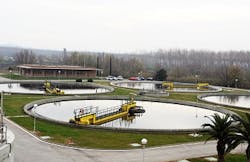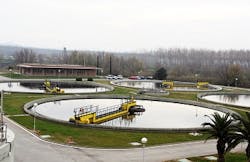Spanish wastewater “smart plant” cuts energy, sludge and chemical use
LLEIDA, Spain – Spanish water company Aqualia Spain has joined forces with IBM Research scientists in a bid to create a smart wastewater treatment plant (WWTP) and reduce its energy consumption.
A pilot project is taking place on the 96,000 m3/day wastewater treatment plant in Lleida.
Developed by scientists in IBM Research - Haifa, Israel, a solution being used at the WWTP consolidates data from a variety of sensors and sources to provide plant engineers with a continuous picture of the wastewater plant’s operational health.
The IBM solution uses machine learning algorithms to learn and predict the impact from changes in weather, plant malfunctions, equipment maintenance, and other factors such as rainfall.
It then recommends the best possible settings and adjustments to keep the plant running efficiently.
Plant operators are provided with recommendations every two hours, seven days a week.
Reported results have been promising to date, including a 13.5% general reduction in the plant’s electricity, a 14% reduction in the amount of chemicals needed to remove phosphorus from the water and a 17% reduction in sludge production.
Total nitrogen removal has also been improved in low temperature conditions.
The results are produced in comparison to how the WWTP was previously run in less predictive mode, based on information not updated in real time.
Jordi Palatsi, plant manager from Aqualia, said: “To cope with operational data from multiple sources, we need an advanced cognitive system that will forecast the dynamic behaviour of our treatment processes. Using IBM advanced analytics, we’ve been able to focus on critical aspects related to incoming and outgoing water conditions and quickly adjust treatment processes in response changing conditions.”
Alexander Zadorojniy, project leader from IBM Research in Haifa, Israel, added: “The analytical models are capable of extrapolating the sensor data to provide a more accurate picture of the current plant status and trends. Based on the operation’s current health, and by using mathematical optimization algorithms, the solution can provide recommendations for the plant engineers, allowing them to make informed decisions about trade-offs regarding electricity and quality.”
###
Read more
Wastewater contract helps Aqualia enter Balkans
Drinking water/wastewater triple contract win across Europe helps Aqualia enter two new markets
FCC Aqualia secures O&M contract for two largest WWTPS in Mecca, Saudi Arabia
Water leakage reduction in Saudi Arabia helps Aqualia scoop award

